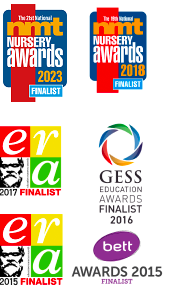The aims of ECaT:
- Raise practitioners’ skills and knowledge.
- Increase understanding and involvement of parents in their child’s language development.
- Promote children’s achievement in early language.
Every Child a Talker (ECaT), has been designed and developed to help childcare settings and practitioners create a developmentally appropriate, stimulating, and supportive environment in which children can enjoy experimenting with and learning language. It can be implemented whether children are in early years settings or at home with their parents.
Selecting the ECaT framework on eylog and using our comprehensive Observe, Assess, Track, Plan, Report structure enables individual learning journeys to be created for children . This provides opportunities for ECaT right from the start of a child’s development through everyday activities which reflect children’s interests, extending their vocabulary and helping them build sentences so that children are confident and skilled communicators before they start school.
From birth, babies are ready to communicate: they listen to and look at people and things in their environment, whilst also responding to what they hear and see. A stimulating environment in which carers and parents can respond sensitively and appropriately to the different meanings of cries, coos and gestures is essential for even the youngest of babies.
Being immersed in a rich environment of words, sounds, rhythm, and expressions from birth has an impact on a child’s language development. This early ability to communicate verbally and non-verbally is the basis on which language is developed.
Having ECaT in place helps you to provide and record the right support for every child’s needs from the start of their development and with tools like an Early Years online learning journal, practitioners have the ability to track progress and prevent any emerging delays, allowing learning to be tailored, so that children are given the help that they need.
Development and Evolution
The Every Child a Talker (ECaT) project has undergone significant development and evolution since its inception. Initially, the project was established in response to growing concerns about language impoverishment in the UK, which was seen as a barrier to children’s progress in school and their future life chances. Recognising the critical importance of early language skills, the ECaT project set out to address these issues head-on.
Over time, the project has expanded its scope to include a wide range of resources and strategies aimed at supporting early language development in children from birth to five years old. This expansion has been guided by the National Strategies’ guidance materials, which have been seamlessly incorporated into the ECaT framework. These materials have provided a solid foundation for the project, ensuring that it remains aligned with national educational goals and standards.
Today, the ECaT project stands as a national initiative dedicated to supporting early years education and development. Its primary focus is on creating a stimulating environment that reflects children’s interests and supports their language skills. By fostering such an environment, the ECaT project helps children to develop the communication skills they need to succeed in school and beyond.
Key Principles and Features
The ECaT project is built on several key principles and features that are designed to support children’s language development. These principles emphasise the uniqueness of each child and the natural process of language development, while also highlighting the crucial role of carers and parents. The key principles include:
- Every child is a unique individual with their own interests and learning style.
- Language development is a natural process that begins from birth.
- A stimulating environment is essential for language development.
- Carers and parents play a crucial role in supporting language development.
- Every child has the potential to become a confident and skilled communicator.
To support these principles, the ECaT project offers a range of resources and strategies aimed at fostering early language development. These include:
- A low-cost online training package for practitioners, designed to enhance their skills and knowledge in supporting children’s language development.
- A variety of activities and games that reflect children’s interests and support the development of language skills.
- A focus on creating a stimulating environment that reduces background noise and promotes the learning of language.
- An emphasis on everyday activities that support language development, such as reading and storytelling.
By adhering to these principles and utilising these resources, the ECaT project ensures that every child has the opportunity to develop strong communication skills from an early age. This holistic approach not only supports children’s language development but also lays the foundation for their future success in school and life.
Supporting Children’s Development with eyworks
From observing and assessing to tracking and planning, eyworks equips you with the tools to support each child’s unique language development journey. To find out more, please contact our friendly team on hello@eyworks.co.uk or book a demo today.

